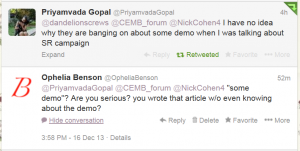Daniel Trilling at the Rationalist Association blog offered their position on gender segregation today. He started with Gopal’s article.
The piece raised concerns about the motivation of the pressure group Student Rights, which has been campaigning on the topic, and the way in which the story had been picked up by the media, but argued that such concerns should not prevent people from criticising the policy.
No, not exactly. Gopal was exceedingly unclear that her concerns were only with Student Rights and the way the media picked up the story. Exceedingly unclear. It was not at all clear that she wasn’t talking about the people who organized and publicized the December 10 protest that triggered the media coverage. If that’s really all she meant to say, she did a very clumsy job of it.
Take the third and last sentence of her opening paragraph for instance.
For us, it is especially difficult to practise a commitment to gender equality and social change in a context so heavily shaped by an intolerant Western ‘liberalism’ passing itself off as ‘secular’, ‘enlightened’ and more knowing-than-thou.
It is just not self-evident that that is not aimed at secular liberals who protested the UUK’s guidance. I still think that looks as if she has exactly those people in mind.
Her next sentence, in the next paragraph, is the one where she gets her facts so wrong, and says Student Rights brought the issue to national attention, with a link to the channel 4 story on the December 10 protest. That link has now been removed, but it was there before, so that is what she thought.
No, it won’t wash. It’s really not that difficult to be clear about what you mean. I know this. I’ve done a lot of editing of other people’s writing, and I know the difference between clarity and the absence of it.
Back to the RA.
Regrettably, our initial choice of headline gave the impression that the piece criticised the whole range of groups who have spoken out on the issue. This includes groups we respect and support, such as the Council of Ex-Muslims and Southall Black Sisters, and a range of other individuals. The protest directed at Universities UK that took place on 10 December was broad based and worthy of support. We’ve now altered the headline but would like to apologise for any misunderstanding.
It wasn’t just the headline though. It really wasn’t.
Back to revisiting Gopal.
In the wake of Student Rights’ aggressive campaign, which clearly targeted Islamic student groups, Universities UK – not a body known for championing social justice – issued guidance indicating that gender segregation of an audience at the request of a speaker at guest lectures was acceptable. The advice was withdrawn when the Equalities and Human Rights Commission deemed this advice discriminatory. The battle lines were drawn once again between so-called ‘muscular liberals’ (generally, in fact, deeply conservative white males with a commitment to the idea that West is Best) and defenders of the rights of minorities to their own customary or traditional practices.
Again – it is far from obvious that she is raising concerns about Student Rights while not doing so about the CEMB or One Law for All or Southall Black Sisters or LSESUASH. It is far from clear that she didn’t mean the snide “muscular liberals” to apply to all opponents of gender segregation, or that she wasn’t herself siding with defenders of the rights of minorities to their own customary or traditional practices.
After that she goes on to point out the obvious, which is that the silly two choices that she herself isolated are not the only possible choices, but she did that only after poisoning the well with all that belligerent rhetoric. If that’s not what she meant to do, she’s just not a good writer. She’s not dense or difficult, she’s just bad at it.
(This is a syndicated post. Read the original at FreeThoughtBlogs.)




